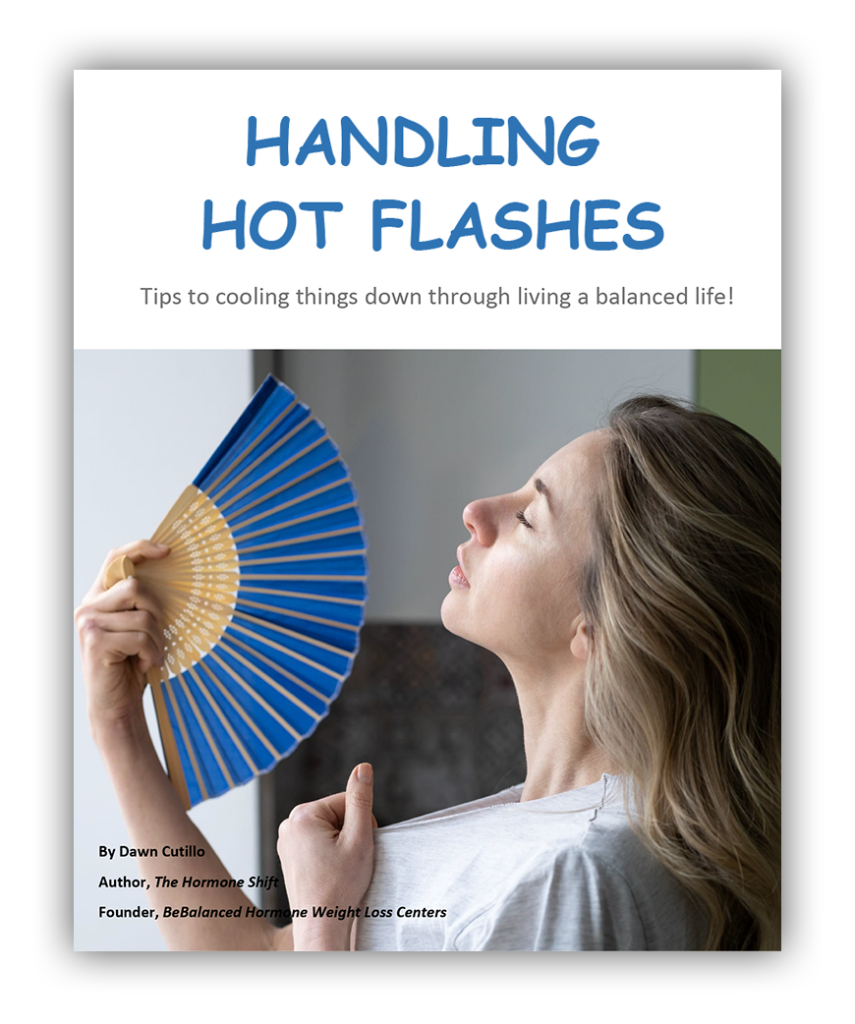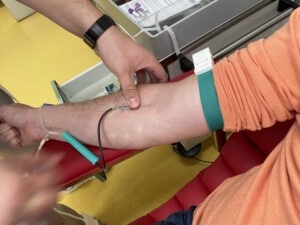By Dawn Cutillo, Author of The Hormone Shift,
Founder BeBalanced Hormone Weight Loss Centers

Is the stress in your life affecting your mood, weight, sleep, and female health? In other words, is stress affecting your quality of life?
The stress of women’s multi-tasking lifestyles can cause the symptoms of hormonal imbalances. These symptoms may cause you to be less effective at work, due to issues involving mood, energy, and sleep. Key hormone imbalances can also cause you to struggle with your weight and many other health issues.
Currently, there are limited alternatives available for women who don’t want to take medications or have risky procedures to lose weight efficiently, improve their mood, deepen their sleep, regulate their cycle, and avoid common PMS and menopausal symptoms.
Many types of emotional stress (family, job, finances, schedules), as well as physical stressors (artificial light, EMF from computers, toxins in foods, pain, lack of sleep, etc.), raise the stress hormone, cortisol. This will indirectly cause many chronic conditions like obesity, hormone-related cancers, and all the irritating PMS/menopausal symptoms! It is all due to the fact that high stress throws off sex hormone balance. Simple education is the key to understanding the basic interaction of women’s sex hormones (estrogen and progesterone) and stress hormones (cortisol), so balance can be achieved.
Hormones 101 – A Foundation
There are three major hormones we need to address: estrogen, progesterone, and cortisol. Understanding their interactions is key to understanding how imbalances can occur, and how they can be reversed.
Estrogen is a female sex hormone that we will say, for our intent here, is the “bad guy” when it comes to weight, mood, and risk for disease. Estrogen, when out of balance, causes you to hold on to fat and fluid, and is also associated with certain neuro-chemicals that will cause you to feel more anxious, eventually depressed, or at the very least, irritable, with mood swings.
Progesterone, the other major sex hormone in women that opposes estrogen, is considered the “good guy” when it comes to weight, mood, and overall health. Progesterone is associated with GABA, which is a neurochemical that is very soothing, relaxing, and aids in sleep. It is also a fat burner and a diuretic, which helps to control weight and blood pressure.
Cortisol is the stress hormone produced by the adrenal gland when we are under chronic stress; it is needed to buffer the body from that stress, and it keeps us alive.
When these hormones are in balance, each one plays its role as directed, and the body functions properly. However, living under chronic stress in our crazy modern society, the body needs much more of the stress hormone (cortisol) to buffer us from the extra stress. That will cause us to run out of the “reserves” to make the constantly-needed cortisol. This results in the body needing to steal from our progesterone and convert this to cortisol. It can do this because progesterone is molecularly very close to cortisol and is easy to convert.
The result is too much estrogen in relation to progesterone, which leaves us with varying PMS and menopausal symptoms. This condition is called “estrogen dominance”, a term coined by Dr. John Lee, an influential and integrative hormone researcher. Dr. Lee’s foundational hormone research, amongst others, has shown that female-related cancers can also increase if there is extreme estrogen dominance.
All the PMS and menopausal symptoms listed below (including basic hypo thyroid, weight gain, female-related cancers, and rapid aging) can be connected to this stress and basic hormone imbalance of estrogen dominance. The degree to which you are imbalanced will determine the actual severity of your symptoms. Mild imbalances may be acne, PMS, or mood swings, then more serious imbalances may lead to full-blown depression/anxiety, and heavy or missed periods. The most severe imbalance can manifest in endometriosis, fibroids, or eventually female-related cancers if other factors are involved of course. In my years of experience, weight and mood are almost always adversely affected by any hormonal imbalance.
Natural ways are available for you to eradicate hormonal symptoms that come around your cycle or at menopause. These solutions are quick, effective and without dangerous side effects.
Hormone Imbalance Symptoms
Hot Flashes/Night Sweats Depression/Anxiety Mood Swings Heavy Periods/Missed
Periods/Endometrioses Ovarian Cysts/ Fibroids Fibrocystic Breast/Breast Tenderness
Bloating/Constipation Headaches Vaginal Dryness / Lack of Libido Thyroid issues
If you are dealing with any of these symptoms most likely they started by having simple common PMS. As women get older, closer to perimenopause, menstrual cycles and their symptoms often get worse. Then at menopause progesterone levels drop even more dramatically because progesterone is released from the hole where the egg comes from (corpus luteum) when a woman ovulates.
Although estrogen might drop 10–20% progesterone drops closer to 80% and this hormone deficiency is related to weight gain and other annoying symptoms and female conditions.
Since progesterone stabilizes blood sugar and is a natural diuretic it automatically keeps the blood sugar and blood pressure in check. This is why after menopause many women see that they become more insulin resistant and have an increase in blood pressure for which they have to take prescription medication.

DOWNLOAD the FREE Guide Book Handling Hot Flashes– Tips to Cooling Things Down Through Living a Balanced Life!
Progesterone also supports the thyroid gland so when it is low, and there are also elevated stress hormones, the thyroid becomes very inefficient and often thyroid hormone levels fall causing the need for medication.
In my experience I have seen that when progesterone levels come up and cortisol levels go down, (1) blood pressure drops quickly to a normal range, (2) blood sugar stabilizes and pre-diabetic medication is able to be lowered or stopped completely, and (3) the thyroid becomes more efficient leading to less need for medication.
Simple things you can do to help rebalance your hormones.
Practice lowering cortisol for at least 20 minutes a day. This can be accomplished via yoga, meditation, breath work, or something called “sound wave therapy”. This is music and binaural beats that relax brain wave patterns from very high and excitable to very slow and relaxing. In only 20 minutes it feels like you took a 2-hour nap.
Increase natural progesterone. This can be done by taking up plant-based progesterone topically. These can be found over the counter but it’s best to find a holistic health practitioner to make sure that you’re getting the right dose and an effective delivery method. The best delivery system is a transdermal method that allows the active ingredients to go directly into the bloodstream and any excesses urinated out. This will balance estrogen dominance for young women as well as menopausal women.
Improve your stress response. This can be done with certain adaptogenic herbs such as Maca and ginseng. These can be taken in an oral form, a tea, or a topical cream that bypasses digestion and goes directly into the bloodstream. These types of herbs will also help preserve some of the progesterone in the body to aid overall estrogen dominance allowing you to have hormone balance to deal with your stress better.
Imbalanced hormones do not have to rule a woman’s life.
I believe a woman can look and feel her best at any age. Improvement can happen quickly and safely without the risk of traditional HRT (hormone replacement therapy) through small steps as listed above. Soon the body will go back to balance which will lead to a beautiful butterfly effect bringing balance to the rest of your life and those around you.
______________________________________________________________________________
For more information or to receive a complimentary
hormone assessment please visit
bebalancedcenters.com
717-569-3040
484 Royer Drive, Lancaster PA 1760





































